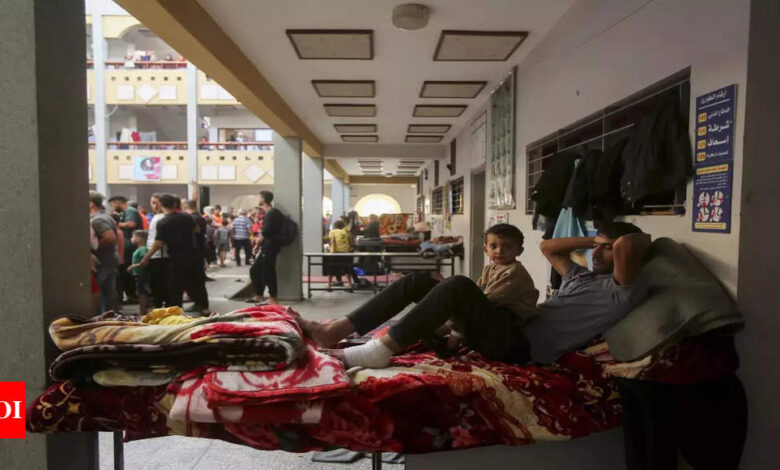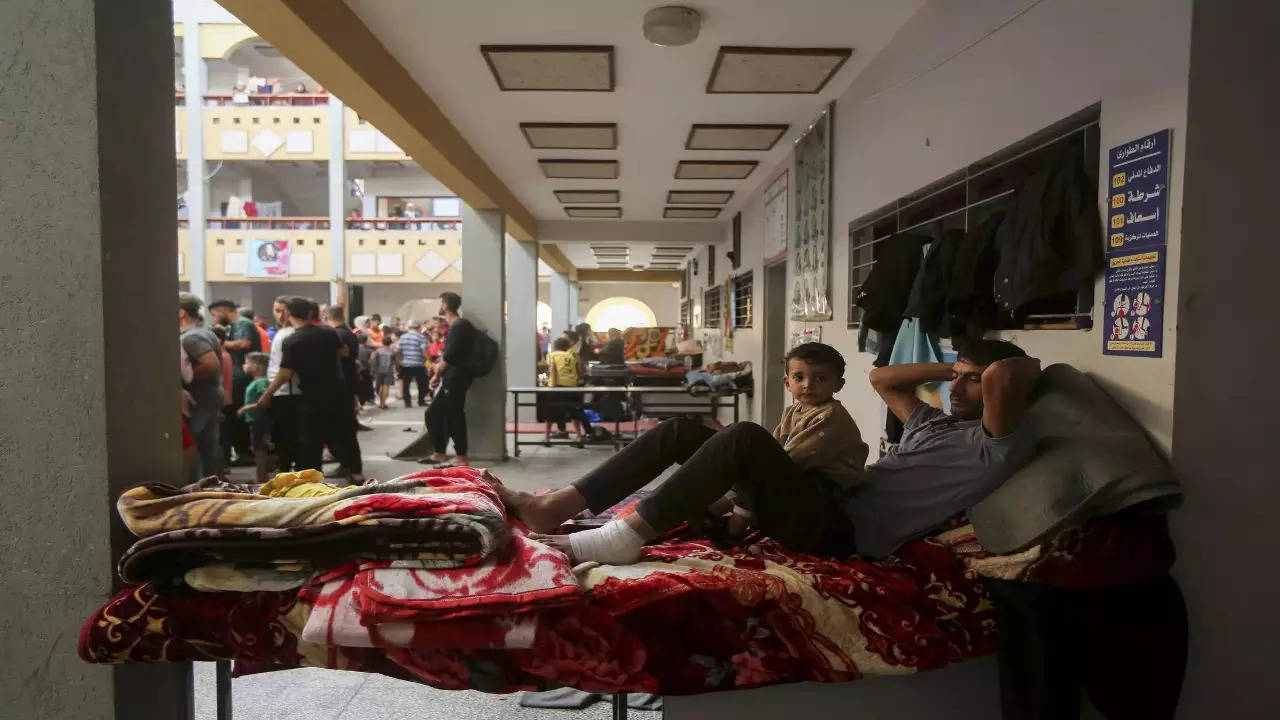World
Heavy fighting rages near main Gaza hospital as Netanyahu dismisses calls for cease-fire

[ad_1]
GAZA STRIP: Israeli strikes pounded Gaza City overnight and into Sunday as ground forces battled Hamas militants near the territory’s largest hospital, where health officials say thousands of medics, patients and displaced people are trapped with no electricity and dwindling supplies. In a televised address on Saturday, Prime Minister Benjamin Netanyahu rejected growing international calls for a cease-fire unless it includes the release of all 239 hostages captured by Hamas in the October 7 rampage that triggered the war, saying Israel was bringing its “full force” to the battle.
Israel has vowed to end Hamas’ 16-year rule in Gaza and crush its military capabilities, while blaming the militants for the war’s heavy toll on the 2.3 million Palestinians trapped in the besieged territory.
Israel has come under mounting international pressure, even from its closest ally, the United States, as the war enters a sixth week. A 57-nation gathering of Muslim and Arab leaders in Saudi Arabia on Saturday called for the war to end, and an estimated 300,000 pro-Palestinian protesters marched peacefully through London – the biggest demonstration in the city since the war began.
Heavy fighting near Shifa Hospital
In Gaza City, residents reported heavy airstrikes and shelling overnight, including in the area around Shifa Hospital. Israel, without providing evidence, has accused Hamas of concealing a command post inside and under the hospital compound, allegations denied by Hamas and hospital staff.
“We spent the night in panic waiting for their arrival,” said Ahmed al-Boursh, a resident taking shelter in the hospital. “They are outside, not far from the gates.”
The hospital’s last generator ran out of fuel on Saturday, causing the death of a premature baby, another child in an incubator and four other patients, according to the Health Ministry in Hamas-ruled Gaza.
“Medical devices stopped. Patients, especially those in intensive care, started to die,” hospital director Mohammed Abu Selmia said by phone over the sound of gunfire and explosions. He said Israeli troops were “shooting at anyone outside or inside the hospital” and prevented movement between buildings.
The World Health Organisation said it lost communication with its contacts at Shifa.
Israel’s military confirmed clashes outside the hospital, but Rear Adm. Daniel Hagari, a spokesman, denied Shifa was under siege. He said troops will assist Sunday in moving babies treated there and said “we are speaking directly and regularly” with hospital staff.
The Health Ministry says there are still 1,500 patients at Shifa, along with 1,500 medical personnel and between 15,000 and 20,000 people seeking shelter. Thousands have fled Shifa and other hospitals that have come under attack, but physicians said it’s impossible for everyone to get out.
The “unbearably desperate situation” at Shifa must stop now, the International Committee of the Red Cross director general, Robert Mardini, said on social media.
Elsewhere, the Palestinian Red Crescent said Israeli tanks were 20 metres from al-Quds hospital in Gaza City, causing “extreme panic and fear” among the 14,000 displaced people sheltering there.
Netanyahu rejects US postwar vision
Netanyahu has said the responsibility for any harm to civilians lies with Hamas. Israel has long accused the group, which operates in dense residential neighbourhoods, of using civilians as human shields.
On Saturday, Netanyahu began to outline Israel’s postwar plans for Gaza, which contrast sharply with the vision put forth by the United States.
Netanyahu said Gaza would be demilitarised and that Israel would retain security control, with the ability to enter Gaza freely to hunt down militants. He also rejected the idea that the Palestinian Authority, which currently administers parts of the Israeli-occupied West Bank, would at some stage control Gaza. Hamas drove the PA’s forces out of Gaza in a week of street battles in 2007.
Secretary of State Antony Blinken has said the US opposes an Israeli reoccupation of Gaza and envisions a unified Palestinian government in both Gaza and the West Bank as a step toward Palestinian statehood. Even before the war, Netanyahu’s government was staunchly opposed to Palestinian statehood.
In another sign of international frustration with Israel, Saudi Arabia welcomed Iran’s President Ebrahim Raisi on Saturday in the first such visit since the two countries mended ties this year. Israel views Iran as its main enemy and had sought to normalize relations with Saudi Arabia before the outbreak of the war.
Evacuation windows, nut no pauses
Israel’s allies have defended the country’s right to protect itself after the Hamas attack, which killed at least 1,200 people, mostly civilians. But now into the second month of war, there are growing differences over how Israel should conduct its fight.
The US has pushed for temporary pauses that would allow for wider distribution of badly needed aid to civilians in the besieged territory where conditions are increasingly dire. However, Israel has only agreed to brief daily periods during which civilians can flee the area of ground combat in northern Gaza and head south on foot along two main north-south roads.
Since these evacuation windows were first announced a week ago, tens of thousands of civilians have fled the north. But Israel is striking what it says are militant targets across central and southern Gaza as well, often killing women and children.
The war has displaced over two-thirds of Gaza’s population, with most fleeing south. Egypt has allowed hundreds of foreign passport holders and medical patients to exit through its Rafah crossing. It has also allowed hundreds of trucks loaded with food and medicine – but no fuel – to enter, but aid workers say it’s nowhere near enough to meet the mounting needs.
More than 11,000 Palestinians, two-thirds of them women and minors, have been killed since the war began, according to the Health Ministry in Gaza, which does not differentiate between civilian and militant deaths. About 2,700 people have been reported missing and are thought to be trapped or dead under the rubble.
Forty-six Israeli soldiers have been killed in Gaza since the ground offensive began, and Palestinians have continued firing rockets into Israel. Hamas is still holding scores of captives – men, women and children – after releasing four women last month. A fifth captive was rescued by Israeli forces.
Late Saturday, thousands of Israelis participated in a rally in Tel Aviv, calling for the return of hostages. In Caesarea, hundreds of protesters gathered near Netanyahu’s home, calling for his removal.
About 250,000 Israelis have been forced to evacuate from communities near Gaza and along the northern border with Lebanon, where Israeli forces and Hezbollah militants have traded fire repeatedly.
Israel has vowed to end Hamas’ 16-year rule in Gaza and crush its military capabilities, while blaming the militants for the war’s heavy toll on the 2.3 million Palestinians trapped in the besieged territory.
Israel has come under mounting international pressure, even from its closest ally, the United States, as the war enters a sixth week. A 57-nation gathering of Muslim and Arab leaders in Saudi Arabia on Saturday called for the war to end, and an estimated 300,000 pro-Palestinian protesters marched peacefully through London – the biggest demonstration in the city since the war began.
Heavy fighting near Shifa Hospital
In Gaza City, residents reported heavy airstrikes and shelling overnight, including in the area around Shifa Hospital. Israel, without providing evidence, has accused Hamas of concealing a command post inside and under the hospital compound, allegations denied by Hamas and hospital staff.
“We spent the night in panic waiting for their arrival,” said Ahmed al-Boursh, a resident taking shelter in the hospital. “They are outside, not far from the gates.”
The hospital’s last generator ran out of fuel on Saturday, causing the death of a premature baby, another child in an incubator and four other patients, according to the Health Ministry in Hamas-ruled Gaza.
“Medical devices stopped. Patients, especially those in intensive care, started to die,” hospital director Mohammed Abu Selmia said by phone over the sound of gunfire and explosions. He said Israeli troops were “shooting at anyone outside or inside the hospital” and prevented movement between buildings.
The World Health Organisation said it lost communication with its contacts at Shifa.
Israel’s military confirmed clashes outside the hospital, but Rear Adm. Daniel Hagari, a spokesman, denied Shifa was under siege. He said troops will assist Sunday in moving babies treated there and said “we are speaking directly and regularly” with hospital staff.
The Health Ministry says there are still 1,500 patients at Shifa, along with 1,500 medical personnel and between 15,000 and 20,000 people seeking shelter. Thousands have fled Shifa and other hospitals that have come under attack, but physicians said it’s impossible for everyone to get out.
The “unbearably desperate situation” at Shifa must stop now, the International Committee of the Red Cross director general, Robert Mardini, said on social media.
Elsewhere, the Palestinian Red Crescent said Israeli tanks were 20 metres from al-Quds hospital in Gaza City, causing “extreme panic and fear” among the 14,000 displaced people sheltering there.
Netanyahu rejects US postwar vision
Netanyahu has said the responsibility for any harm to civilians lies with Hamas. Israel has long accused the group, which operates in dense residential neighbourhoods, of using civilians as human shields.
On Saturday, Netanyahu began to outline Israel’s postwar plans for Gaza, which contrast sharply with the vision put forth by the United States.
Netanyahu said Gaza would be demilitarised and that Israel would retain security control, with the ability to enter Gaza freely to hunt down militants. He also rejected the idea that the Palestinian Authority, which currently administers parts of the Israeli-occupied West Bank, would at some stage control Gaza. Hamas drove the PA’s forces out of Gaza in a week of street battles in 2007.
Secretary of State Antony Blinken has said the US opposes an Israeli reoccupation of Gaza and envisions a unified Palestinian government in both Gaza and the West Bank as a step toward Palestinian statehood. Even before the war, Netanyahu’s government was staunchly opposed to Palestinian statehood.
In another sign of international frustration with Israel, Saudi Arabia welcomed Iran’s President Ebrahim Raisi on Saturday in the first such visit since the two countries mended ties this year. Israel views Iran as its main enemy and had sought to normalize relations with Saudi Arabia before the outbreak of the war.
Evacuation windows, nut no pauses
Israel’s allies have defended the country’s right to protect itself after the Hamas attack, which killed at least 1,200 people, mostly civilians. But now into the second month of war, there are growing differences over how Israel should conduct its fight.
The US has pushed for temporary pauses that would allow for wider distribution of badly needed aid to civilians in the besieged territory where conditions are increasingly dire. However, Israel has only agreed to brief daily periods during which civilians can flee the area of ground combat in northern Gaza and head south on foot along two main north-south roads.
Since these evacuation windows were first announced a week ago, tens of thousands of civilians have fled the north. But Israel is striking what it says are militant targets across central and southern Gaza as well, often killing women and children.
The war has displaced over two-thirds of Gaza’s population, with most fleeing south. Egypt has allowed hundreds of foreign passport holders and medical patients to exit through its Rafah crossing. It has also allowed hundreds of trucks loaded with food and medicine – but no fuel – to enter, but aid workers say it’s nowhere near enough to meet the mounting needs.
More than 11,000 Palestinians, two-thirds of them women and minors, have been killed since the war began, according to the Health Ministry in Gaza, which does not differentiate between civilian and militant deaths. About 2,700 people have been reported missing and are thought to be trapped or dead under the rubble.
Forty-six Israeli soldiers have been killed in Gaza since the ground offensive began, and Palestinians have continued firing rockets into Israel. Hamas is still holding scores of captives – men, women and children – after releasing four women last month. A fifth captive was rescued by Israeli forces.
Late Saturday, thousands of Israelis participated in a rally in Tel Aviv, calling for the return of hostages. In Caesarea, hundreds of protesters gathered near Netanyahu’s home, calling for his removal.
About 250,000 Israelis have been forced to evacuate from communities near Gaza and along the northern border with Lebanon, where Israeli forces and Hezbollah militants have traded fire repeatedly.
#Heavy #fighting #rages #main #Gaza #hospital #Netanyahu #dismisses #calls #ceasefire






